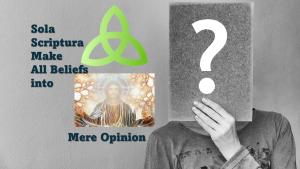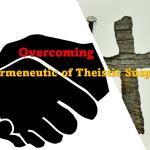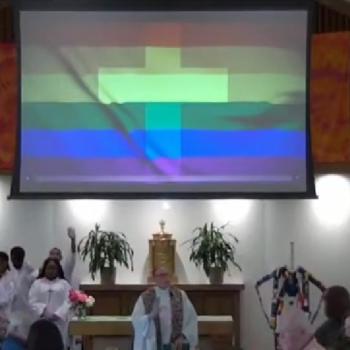I often write about sola scriptura (SS) and its consequences. One of my main concerns is the fact that SS allows for all kinds of interpretations (opinions) of Scripture. Adherents of SS seek to assuage one another by “agreeing” on the “essentials,” while offering tolerance for the “nonessentials.” For most Protestants, these “essentials” tend to reside under the umbrella of Nicene-Chalcedonian Christianity, a Christianity that affirms belief in the Trinity and the Incarnation. Moreover, to deny the “essentials” of the Trinity and Incarnation means to deny biblical Christianity and embrace heresy (heresy here understood as unbiblical beliefs).
However, others who also identify as Protestants use SS to expand the list of “nonessentials” to include the Trinity and Incarnation. According to these Protestants, belief in the Trinity and Incarnation as “essential” dogmas represents the last great stranglehold of Catholicism on true biblical Christianity. To escape this last vestige of Catholicism, Protestants must embrace what Dr. Steven Nemes calls post-Catholicism (PC). To these PC Protestants who also adhere to SS, belief in the Trinity and Incarnation represent at worst a Catholic error, or at best, a theologoumenon, or non-authoritative individual theological opinion. In other words, in their appeal to SS, PC Protestants deny the Trinity and Incarnation and posit that heresies themselves cease to exist in any meaningful way.
Now, which is it? Using SS, how do non-PC Protestants prove beliefs in the Trinity and Incarnation are “essential” and not mere theologoumenon? The short answer is, using SS, non-PC Protestants cannot prove beliefs in the Trinity and Incarnation are not mere theologoumenon.
In this article, I explain why once Church authority is abandoned, all theological beliefs essentially become mere theologoumenon.
A Tough Title
Coming up with a title for this article proved difficult. For example:
How to Argue Like An Arian
Do Protestants Hold to Dogmas?
SS Means Protestants Need to Loosen Up On “Dogma”
The above represents some of the ideas floating around my head as I prepared for the article. Eventually, I settled on using each as a subheading, as they each reflect key factors of my argument.
How to Argue Like An Arian
In a past article, I asked how Protestants escape theological errors when all their beliefs equate to fallible, unbinding theological opinions based on their individual (and their individual traditions) interpretations of the Bible. Even an appeal to small “t” tradition (or ministerial magisterium) does not sidestep the fact that each individual Protestant ultimately binds their conscience to the Bible alone, not a church, creed, or dogma. In fact, when Protestants argue using SS, they argue in the spirit of Arius. Arius, and the different Arians (and I include Dr. Nemes in the camp) who followed after him rejected the language of “substance” and “essence” (ousia) and same “substance” and “essence” (homoousia) because this kind of theological language does not appear in the Bible but in the writings of Catholic theologians. The Arian Second Creed of Sirmium plainly states Arius’ view regarding ousia and homoousia. It states that:
…in divine Scripture nothing is written about them, and that they are above men’s knowledge and above men’s understanding.
Therefore, according to Arius and his followers, since the concept, and more importantly the words, fail to appear in Scripture, Scripture rejects the concept altogether. Even more interesting, the same method gets used by Protestants against Catholic beliefs. In this way, Protestants do indeed argue like Arians.
Do Protestants Hold to Dogmas?
Moreover, this leads me to my next thought: do Protestants hold to dogmas? Now, this may come across as a very Catholic question, as Protestants do not usually use the word. The dictionary definition of dogma is “an unquestionable truth decreed by the church or by God.” Most Protestants hold the “five solas” on a near-dogmatic level, including SS. Again, some non-PC Protestants also place the Trinity and the incarnation on a near dogmatic level. PC Protestants, like Dr. Nemes, see dogmatic adherence to these holdovers from Catholicism as unintentional “religious terrorism,” since non-PC Protestants place PC Protestants outside authentic Christianity if they deny the Trinity and Incarnation. For them, Nicene-Chalcedonian Christianity represents true biblical Christianity. As with post-Catholics, non-post-Catholic Protestants come to these beliefs through sola scriptura.
Furthermore, Dr Nemes, and PC Protestants like him, deny the Nicene-Chalcedonian Christianity definition of the Trinity and Incarnation. In fact, PC Protestants’ understanding of the Trinity and Incarnation directly contradict the views of Nicene-Chalcedonian Christianity and non-PC Protestant, hence Dr. Nemes’ motivation to make these beliefs theologoumenon.
SS Means Protestants Need to Loosen Up On “Dogma”
In an interview on the YouTube channel “Transfigured”, Dr. Nemes made the following claims about the Trinity and his mission to Nicene-Chalcedonian Christianity to account for their inherent inconsistencies. He states in reference of a former professor of his, Oliver Crisp, calling the Trinity a “dogma:”
I think Oliver is in a position of tension given the fact that for him it’s a dogma, but he is not a Catholic… and for him, Scripture is still the ultimate theological authority. So, given that Scripture has this priority for theology, it seems to me that you cannot have it both ways. You cannot say that the Trinity is a dogma but at the same time, that it has poor attestation in Scripture. What’s happening then is that Scripture’s authority is being normed by something else. By the reception and Catholic tradition or something like that.
I’m trying to call Trinitarians to loosen up a little bit. You don’t have to give up your Trinity theory, if you think that it’s true, but you should not call it a dogma given that even world-renowned defenders of the doctrine of the Trinity admit openly that it does not have clear and unambiguous attestation in Scripture. [edited from transcript for clarity]
Let’s break Dr. Nemes’ argument down.
The Trinity as Mere Theologoumenon
Dr. Nemes’ argument holds some merit. If the Trinity lacks sufficiently clear attestation in Scripture, and Scripture holds theological primacy, then the term “dogma” (or anything near it) cannot also apply. Likewise, with the Incarnation.
Dr. Nemes also hits the mark in reference to “Catholic tradition” norming the “dogma” of the Trinity. Arians notice correctly that the words ousia and homoousia never appear in Scripture. These words entered the discussion of God’s nature as the Church attempted to understand the relationship between Father, Son, and Holy Spirit. The Church then officially incorporated these words through authoritative Church councils. Once the Church defined the dogma, debate ceased and theologoumenon ended.
Therefore, if we remove the Catholic Church from the equation, Dr. Nemes assertions prove correct.
Final Thoughts…
Without the Church, the Trinity and Incarnation as Mere Theologoumenon
To conclude, allow me to bring the point regarding how SS makes all beliefs in mere theologoumenon. Remember, both PC Protestants and non-PC Protestants accept as near dogma SS, however both reach contradictory conclusion about the Trinity and Incarnation. Both also place the Church under the authority of Scripture alone.
Consider these two statements below. The first comes from the Trinity and Incarnation denying Racovian Catechism (one embraced by Dr. Nemes). The latter comes from the Trinity and Incarnation affirming Westminster Confession of Faith.
Although some difficulties do certainly occur in them; nevertheless, those things which are necessary to salvation, as well as many others, are so plainly declared in different passages, that everyone may understand them, especially if he be earnestly seeking after truth and piety, and implore divine assistance.
And
All things in Scripture are not alike plain in themselves, nor alike clear unto all; yet those things which are necessary to be known, believed, and observed, for salvation, are so clearly propounded and opened in some place of Scripture or other, that not only the learned, but the unlearned, in a due use of the ordinary means, may attain unto a sufficient understanding of them.
Given the similarities in the two statements above, how do even beliefs like the Trinity and Incarnation not become mere theologoumenon?
Thank you!
Read The Latin Right’s other writing here.
Please consider donating to the worthy cause in the link below. This charity provides must needed food to families in Pakistan. My good friend, Matthew Graham recommended this charity.
The Holy Heaven Ministry Pakistan














